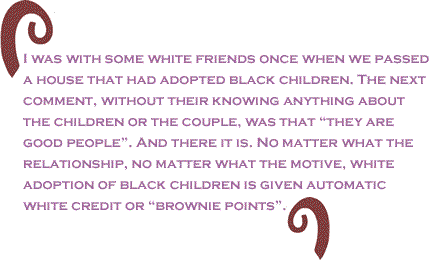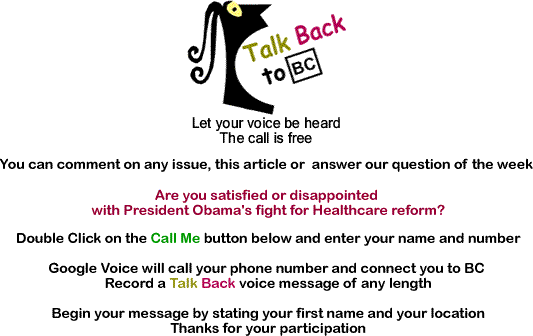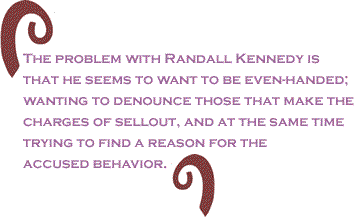
|
||||||||||||||||||||||

|
|
 |
|
| Yes, there was a period of time in my life when I was called a sellout. Actually, those were not the words used, at least to my face. I was told more or less, as President of a local chapter of a national women’s business owners group, that I was helping white women do business. I came to the conclusion that I was a sellout after reading Randall Kennedy’s book, “Sellout – The Politics of Racial Betrayal”. But I am in good company. According to his book, most prominent persons in Black American history have, at one time or another had the label affixed to them. One of the most surprising was WEB Du Bois, who, during World War I, when he wrote an essay to the effect that African descendants should support the war effort, despite the fact that there was not only a segregated army; but that the officers would be whites; that the soldiers would be ill-treated. He wanted Blacks to support the war effort because he was angling for a commission for himself (for reasons that are not explained). A latter day sellout, called a Black Trojan Horse by Professor Martin Kilson, would be Cory Booker, the Mayor of Newark, accusing him of being in the service of white conservatives. But Kennedy makes the point that Booker is called so based on a couple of activities: speaking at the Manhattan Institute, a conservative think-tank and having the Republican conservative columnist, George Will, write favorably about him. His point seems to be that his activities are not the man. Hmmm! I owned, for ten years, a commercial and residential cleaning company. Just before I started my business, I attended a women business owners conference in New York. I joined the association that put on the conference, rightly assuming that I would learn a lot of what I needed to know and understand about being a first time business owner. . A few years after joining and being active, I was asked to run for president, which I turned down. At some point I became Secretary of the board, third in line, when the then President and Vice-President, in mid-term, at a regular monthly meeting, resigned. If it had occurred to them to give me a heads up, they didn’t. To the expressed surprise of some, I accepted the position. I went on to be elected for two additional terms (the limit of service). I was also a member of a black business owners group as well, which was chiefly centered in Queens. It was some of these members who accused me of selling out. Many corporate and municipal entities had women/minority business departments. One corporation in particular, had two black women who headed and staffed their department, one in charge of women businesses and one for minority businesses. Departments within the corporation were given credits for using/buying services out of the women/minority pool. Although I am female, as a minority, I had to use the minority side of the department, despite the fact of my involvement in a women’s business owner group. That left women to mean white women almost exclusively. Within the corporation, the various departments, in order to get their credits, showed a very clear preference to use women businesses for their purchased services. For all those who thought that Blacks in business were getting a leg up and a pass, you’re wrong. In a study it was found that white women were the main beneficiaries of corporate and municipal affirmative action business contracts, garnering 51 percent. In the construction trades, with which the City did a lot of business, it became a scandal that all of those businesses were suddenly headed by women – at least on paper. But there was a sellout opportunity I didn’t take. I was approached by the African American representative of a major supermarket/pharmacy that wanted to do business with my company. Supermarkets and movie theaters would hire cleaning services to start at the close of business for the day. At movie theaters that could be around midnight more or less in some places. The cleaners would be locked in overnight, unable to leave until a manager arrived in the morning. In order to take on what looked like a lucrative opportunity for my company, I would have to pay my employees less than they were making. (The nature of the contract left no room at the rate of my pay scale to pay taxes and overhead as well as make a profit). I could have hired new crews at lower wages, but someone would have told someone about the differential, and I would have more problems keeping staff. Nor could I staff the jobs with the amount of employees I thought needed to do a good job. The terms of the company’s contract dictated how many employees and how much they would be paid, and the conditions under which they would work. I was suspicious of this “opportunity” from the beginning. This kind of business would usually be up for bid; you would, after inspection, write a proposal, and then wait to see if you wrote the best one. They usually don’t come a-courting. The representative, questioned about the staffing, admitted that in their Long Island stores (read white neighborhoods), they had larger crews. My company was to be used for stores in Harlem and Brooklyn where, he also admitted they didn’t expect the stores to be as clean. Most of my employees were African or Hispanic descendants who lived in Harlem and the Bronx and Brooklyn. How could I permit them (or myself) to participate in the degradation of their own neighbors and neighborhoods?
The problem with Randall Kennedy is that he seems to want to be even-handed; wanting to denounce those that make the charges of sellout, and at the same time trying to find a reason for the accused behavior. For example, Frederick Douglass, after the death of his wife, married a white woman and lost a lot of the credibility he had accrued. But Kennedy’s spin is that Douglass was married to his African descendant wife for forty-two years, so, I guess, it is all right that he married a white woman because he married a black one first. Huh? He deals with intermarriage as if it is a politically free notion involving only the two people so engaged. In fact, he wrote a book about it (that I have not read – but from which he quotes himself in this book). Another topic he chooses to defend is cross racial adoption. He does not question or even think about what it means. First of all, it is generally whites adopting black children, and not the other way around. I suspect that he would use the industry propaganda if he had to think about it and then investigate, that there are not enough black adoptive couples to go around. There is a colonial history on three continents in which indigenous children are purposefully removed from their families and given to white families, as a way of destroying the native population. The Aborigines of Australia have asked for and are still awaiting an apology for what was done to them. It was done with Yemenite women; Greek women, and most famous of all, in Germany during Hitler’s reign. Mothers would be told, after giving birth, that their baby died. The children would be spirited out of sight. At one time I worked with an engaged Jewish couple who planned to adopt a black child after their marriage. Their plan was to have their own children the old-fashioned way, but to adopt a black child as well. When I questioned them about this, I realized that the child was going to be used on many levels; that the child was going to be a political/social tool. They were going to teach their own children tolerance through the use of this child in their lives. And of course they would get social credit for being “good people” merely because they adopted a black child, a credit they might not have, or might not even seek, possibly preferring to present a Jewish child as biologically their own. I was with some white friends once when we passed a house that had adopted black children. The next comment, without their knowing anything about the children or the couple, was that “they are good people”. And there it is. No matter what the relationship, no matter what the motive, white adoption of black children is given automatic white credit or “brownie points”.
The issue here is that Kennedy sees only the surface and assumes some purity of what he finds there. In the case of adoption, if he ever went online to adoption forums, he would have quickly found out that there are serious issues that adoptees and adopters have to deal with; that adoption is not always a “happily ever after” state on all sides. And these are the adoptions that don’t have a cross racial component to them. Add race, add another element. In the case of interracial marriage, for which he has written another book, he does not examine the obvious, which is the same obvious in cross racial adoptions, that what is overwhelmingly the case is black men marrying white women. Before writing this he should have read, Raj Paten’s “Why Black Men Marry White Women”. He would have read about some of the implications that go into those choices, some of the self-hatred for ones Africanness; or a desire to make “pretty” (read lighter) babies. But also some of the historical/social reasons why. (There is another equivalent – Asian women, of whom you could say, are not white – but the point, I think, is that they are not black). His last chapter is on “passing” and why some would. Again, maybe he is for it or maybe he is not; you don’t know. He quotes some of those who think of passing as trickster behavior. But the trickster has a long and affectionate life in African American culture. He says that “passing” is a kind of self-hatred. It is the desire escape one’s Africanness which accepts a notion of inferiority. But of course he equivocates a bit, going on about how racial definitions are defined and by whom and for what reason. The largest chapter in this small book (196 pages 2/3 size), is devoted to Clarence Thomas, one whose very name has become a synonym for sellout. You could think from this chapter alone, that Thomas really should hire Kennedy to do his pr. Kennedy in his “even-handedness”, examines the reasons for Thomas’ censure by the community: his marrying white, his denigration of affirmative action; his public castigation of his sister for being on welfare (my favorite one); his support for prison officials doing segregation by race. In each case he finds the Thomas rationale, and asks that we accept his explanations on its face. And if Thomas said he decided thus and so for this or that reason, who are we to question his assertions. For example, he says that Thomas later apologized to his sister and she accepted it and accepted his explanation for publicly humiliating her. Kennedy does not seem to notice that the apology was a private affair, known to him only through hearsay. At
the end of the book “Sellout”, he mentions that he was motivated
by having received this designation himself. One of the occasions
was his testifying for the defense in a trial in which a black man
was brutally beaten by a white man who started the altercation with,
“What up Nigga”. Kennedy had previously
written a You have to wonder, as Kennedy does not here, why he chose to be an expert witness. He says that he received no remuneration at all. Those who called him a sellout for testifying might have thought he did it for money, which might make its own kind of sense. But since he did not, why? He must have thought he was doing justice; doing fairness. And if that fairness hurt one side, well, that was only fair, wasn’t it? It is as if we African descendants sometimes think we have to bend over the other way to prove ourselves; to let others know; to show them, “see, we can do the right thing”. But it is a misguided notion. Fortunately, in this case, his testimony didn’t help the defense, but that he thought he had to do it; that there was some moral code at work here that he had to obey, is the issue. In a group once, in which I was the only African descendant, one person was making racist remarks to me. No one else said anything as he was saying them. I pointed out both the ignorance and stupidity of his remarks. Apparently I was effective because the same people who said nothing leaped to his defense, asking me to stop. I pointed out that they had said nothing when he made his comments, but they were unapologetic. They had no problem with being fair or unfair – they were clear which side they were on. Yes, I have been what would be called a sellout, albeit innocently enough (or at least unconsciously enough). And as I read “Sellout”, some other moments came to mind. I was in a situation where one black woman was telling a white woman, about some racist emails sent to certain people in the organization, and asked her how she could be supportive of the person who was chiefly responsible for sending them. The white woman said she didn’t believe her; that she never saw them; and said “show me”. At that moment the black woman could not find them, although insisted they existed and who they came from. Insanely enough, I defended the white woman’s charge that maybe they didn’t really exist if they could not be found. I should have kept my mouth shut. I should have just listened. The black woman was correct and I saw them at a later date, but I should not have doubted what she said in front of this woman. I should not have doubted that they existed just because they could not be found. I was selling out the black woman for no other reason than I thought I was being judicious.
You could say I should have known better. That is one of the issues that Kennedy deals with in this book that makes having read it worthwhile. In fact, the notion of writing a book on selling out, no matter what its actual usefulness to the discussion, was its own good idea. But the “he should have known better”, theme has always puzzled me. “Should have known better” to one who doesn’t know at all, is worthless. If you don’t know what you don’t know and you are shamed for not knowing what you don’t know, you are left with defending your ignorance rather than gaining knowledge. The person doing the shaming is not educating you only pointing out your lack of same. I also know from experience that there are no rewards for even-handedness. If I was a sellout because of my leadership in the business association, there were no thanks or appreciation for it. Some of the newer white women had no problem calling me a racist. The board I had chosen to work with me was nearly half People of Color, where previously there had only been minimal token representation. So while these same women, year after year talked about getting more People of Color into the organization, of course what they really wanted was window dressing but not power. Listen, there are many of us who think OJ did it, (and of course Chris Darden was labeled a sellout for being with the prosecution), but that does not mean we had to say it out loud. And it does not mean we were not rooting for him, even if he was a sellout in many ways to his own family and community. Way too many white men have gotten away with killing black men, even when known who they were, to not to want to see OJ get over. It was doubly gratifying that his attorney was an African American too. For those who thought he didn’t do it, listening to them sometimes (because it is a case still talked about all these years later), you hear them twisting themselves around whatever flimsy evidence they can; coming up with elaborate reasons for which there was never any real material presented, to make it come out right. You could say they are selling in. Charging sellout can be another form of “celebrity bashing”, in which sometimes you assassinate the character of the individual; complain but don’t explain. It is an American form of discourse that goes around in a circle, landing no place. The person accused goes into defense mode; the accuser is angry and disappointed. And who learns what? So, “Sellout” is in many ways a defense of Randall Kennedy against those charges. He does not examine his own behavior, only defends it and uses examples of others as back up. In my own case I don’t think I would have ever seen some of my own behavior in that light if not for reading this. I did not expect to find myself within these pages. So, in that sense, this was very, very useful. It has put me on notice to myself, and that is a good thing. But I don’t know what it has done for him. He never says. But in the end I have to say, it is a good thing Randall Kennedy is not a criminal attorney. Who wants a lawyer who thinks the other side makes a good point?
BlackCommentator.com Guest Commentator Jessica Watson-Crosby is Chair National Committee – Black Radical Congress and Co-Chair, Black Radical Congress-New York. Click here to contact Ms. Watson-Crosby. |
|
 |
|
Any BlackCommentator.com article may be re-printed so long as it is re-printed in its entirety and full credit given to the author and www.BlackCommentator.com. If the re-print is on the Internet we additionally request a link back to the original piece on our Website. Your comments are always welcome. eMail re-print notice
If you send us an eMail message we may publish all or part of it, unless you tell us it is not for publication. You may also request that we withhold your name. Thank you very much for your readership. |
|
| |
|
| September24
, 2009 Issue 343 |
|
| Executive Editor: Bill Fletcher, Jr. |
| Managing Editor: Nancy Littlefield |
| Publisher: Peter Gamble |
| Est. April 5, 2002 |
Printer Friendly Version
in resizeable plain
text format or pdf
format. |
 |

|
| |
| |











































